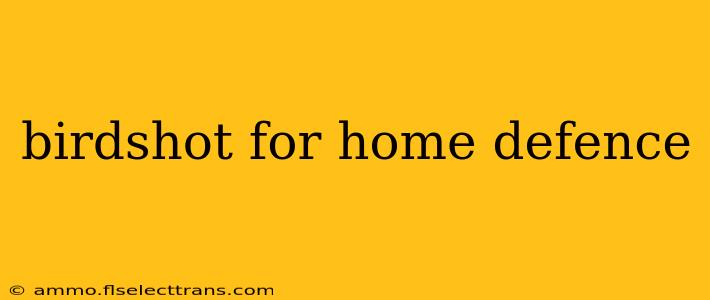Choosing the right firearm for home defense is a crucial decision, demanding careful consideration of various factors. While some advocate for high-powered rounds, others suggest birdshot as a viable option. This article delves into the complexities of using birdshot for home defense, exploring its effectiveness, legal implications, and potential drawbacks. We'll analyze its performance against common threats and provide a balanced perspective to help you make an informed choice.
The Case for Birdshot in Home Defense
Some proponents argue that birdshot offers several advantages in a home defense scenario:
-
Reduced Overpenetration: Compared to larger calibers, birdshot's lower energy and fragmentation significantly reduce the risk of bullets traveling through walls and injuring innocent bystanders. This is a critical consideration in densely populated areas or homes with thin walls.
-
Less Recoil: The gentler recoil of birdshot can be beneficial for individuals with less experience handling firearms, making it easier to maintain control and accuracy during a stressful situation. This ease of handling can improve the speed and accuracy of follow-up shots.
-
Psychological Impact: The loud report and spreading shot pattern can potentially startle or incapacitate an intruder, offering a chance to de-escalate the situation. The immediate pain caused by numerous pellets can also be a deterrent.
The Drawbacks of Birdshot for Home Defense
Despite the potential advantages, it's crucial to acknowledge the significant drawbacks of using birdshot for home defense:
-
Limited Stopping Power: Birdshot's relatively low energy means it may not be effective in stopping a determined attacker. The effectiveness is highly dependent on shot placement and the attacker's physical condition. Multiple hits may be needed to incapacitate an assailant.
-
Short Effective Range: The spread of birdshot pellets diminishes its effectiveness beyond a very short range (typically under 15-20 feet). Beyond this range, the pellets spread too widely to deliver a reliable incapacitating blow.
-
Legal Considerations: Local laws regarding firearm usage and appropriate ammunition vary significantly. While birdshot may be legally permissible for hunting small game, its appropriateness for self-defense could be challenged legally. You must be fully compliant with your local and state laws. Consulting with a legal professional familiar with firearms law is highly recommended.
-
Barrier Penetration Concerns: While birdshot has less overpenetration than many other rounds, it's still crucial to understand that even birdshot can penetrate certain materials, like drywall or thin wood. Thoroughly assess your home's construction to determine the potential risks.
Alternatives to Birdshot for Home Defense
Many other ammunition types offer greater stopping power and penetration capabilities for home defense, including:
-
00 Buckshot: A common choice offering a balance between stopping power and manageable recoil.
-
Slugs: Provide maximum stopping power but with increased potential for overpenetration.
-
.223 Remington or 5.56 NATO: These smaller caliber rounds offer a balance between stopping power and reduced overpenetration compared to larger calibers, although penetration is still significantly higher than birdshot.
Conclusion: Making an Informed Decision
The decision of which ammunition to use for home defense is intensely personal and must be made carefully, considering individual circumstances, legal parameters, and the specific threats faced. Birdshot's limited range and stopping power raise serious questions about its effectiveness as a primary home defense round. While its reduced overpenetration is a significant advantage, the potential for failure to incapacitate an attacker outweighs this benefit for many. Thorough research, professional training, and legal counsel are essential when deciding on your home defense strategy and the appropriate ammunition to use. This information is for educational purposes only and should not be considered legal or professional advice. Consult with qualified experts for personalized guidance.

